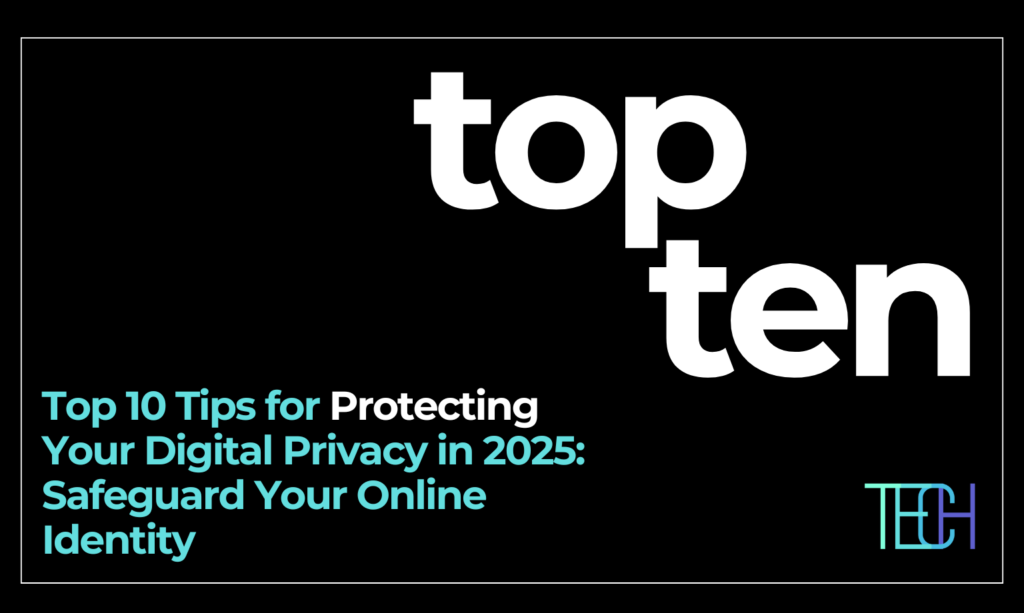Top 10 Tips for Protecting Your Digital Privacy in 2024: Safeguard Your Online Identity
In today’s digital era, online privacy has never been more important. With cyber threats constantly evolving and data breaches on the rise, it’s crucial to take steps to protect your personal information. Whether you’re browsing the web, using social media, or shopping online, your digital footprint is always at risk. Fortunately, there are practical strategies and tools you can use to secure your data and protect your digital privacy. Here are the Top 10 Tips for Protecting Your Digital Privacy in 2025.
- Use Strong and Unique Passwords
Why It’s Important:
Weak and reused passwords are the easiest way for hackers to gain access to your accounts. Using strong passwords (a mix of letters, numbers, and symbols) and avoiding common phrases can drastically reduce your chances of falling victim to a cyberattack.
Tip: Use a password manager like LastPass or 1Password to generate and store strong, unique passwords for each account. This minimises the risk of password reuse and simplifies managing your credentials. - Enable Two-Factor Authentication (2FA)
Why It’s Important:
Two-factor authentication (2FA) adds an extra layer of security by requiring not only your password but also a second form of verification (e.g., a text message code, or an authentication app like Google Authenticator). Even if your password is compromised, 2FA makes it much harder for attackers to access your accounts.
Tip: Activate 2FA on all your critical accounts, including email, banking, and social media accounts. Many services offer 2FA through text, email, or apps, which are all more secure than using just a password. - Use a Virtual Private Network (VPN)
Why It’s Important:
A VPN encrypts your internet connection, protecting your data from hackers, especially on public Wi-Fi networks. It also masks your IP address, making it harder for websites to track your online activities.
Tip: Choose a reliable VPN service like ExpressVPN or NordVPN to encrypt your internet traffic and protect your privacy when browsing or accessing sensitive information online. - Regularly Update Software and Apps
Why It’s Important:
Software updates often include security patches that fix vulnerabilities that hackers can exploit. Failing to update your operating system, browsers, and apps leaves you exposed to cyberattacks.
Tip: Set your devices to automatically update whenever a new version of software is available. Regularly update apps on your smartphone and computer, and ensure that your browser has the latest security fixes. - Limit the Personal Information You Share Online
Why It’s Important:
Oversharing on social media or websites can make you an easy target for identity theft or phishing attacks. The more information you provide online, the more easily hackers can use it to impersonate you or gain access to sensitive accounts.
Tip: Be selective about the information you share on social media platforms like Facebook or Instagram. Avoid posting details like your address, phone number, or birthdate in public spaces. - Be Cautious with Public Wi-Fi
Why It’s Important:
Public Wi-Fi networks, such as those in cafés, airports, and hotels, are often unsecured, making them a prime target for cybercriminals to intercept your data.
Tip: Avoid accessing sensitive information, like banking details or email accounts, when using public Wi-Fi. If you must use it, make sure you’re connected to a VPN to encrypt your traffic and keep your data safe. - Encrypt Your Data
Why It’s Important:
Encryption ensures that even if your data is intercepted or stolen, it remains unreadable without the decryption key. Encrypting sensitive data, both on your devices and in transit, is a key component of maintaining digital privacy.
Tip: Use full disk encryption tools like BitLocker (for Windows) or FileVault (for macOS) to encrypt your devices. For files you store in the cloud, consider services like Tresorit or Sync.com that offer end-to-end encryption. - Review Privacy Settings on Social Media
Why It’s Important:
Many social media platforms default to sharing your information with a wider audience than you may realise. Adjusting your privacy settings allows you to control who can see your posts and personal details, reducing the amount of information others can access.
Tip: Regularly review your privacy settings on platforms like Facebook, Twitter, and LinkedIn. Set your posts to be visible only to people you trust, and disable location tracking or automatic check-ins unless absolutely necessary. - Be Aware of Phishing Attacks
Why It’s Important:
Phishing scams trick you into revealing personal information, such as login credentials or credit card details, by pretending to be a legitimate entity like your bank or a trusted service. These attacks are often carried out via email, text, or even phone calls.
Tip: Always double-check the sender’s email address or phone number, especially if the message contains a link or attachment. If you’re ever in doubt, contact the company directly via their official website or customer service line before responding to the communication. - Use Secure, Trusted Websites
Why It’s Important:
When shopping online or entering personal information, you must ensure the website you’re using is secure. Unencrypted websites are vulnerable to cyberattacks that could compromise your personal data.
Tip: Before entering any sensitive information on a website, look for the padlock icon and ensure the URL begins with https:// (the “s” stands for secure). Avoid purchasing from websites that don’t have this level of security, especially if you’re entering payment details.

